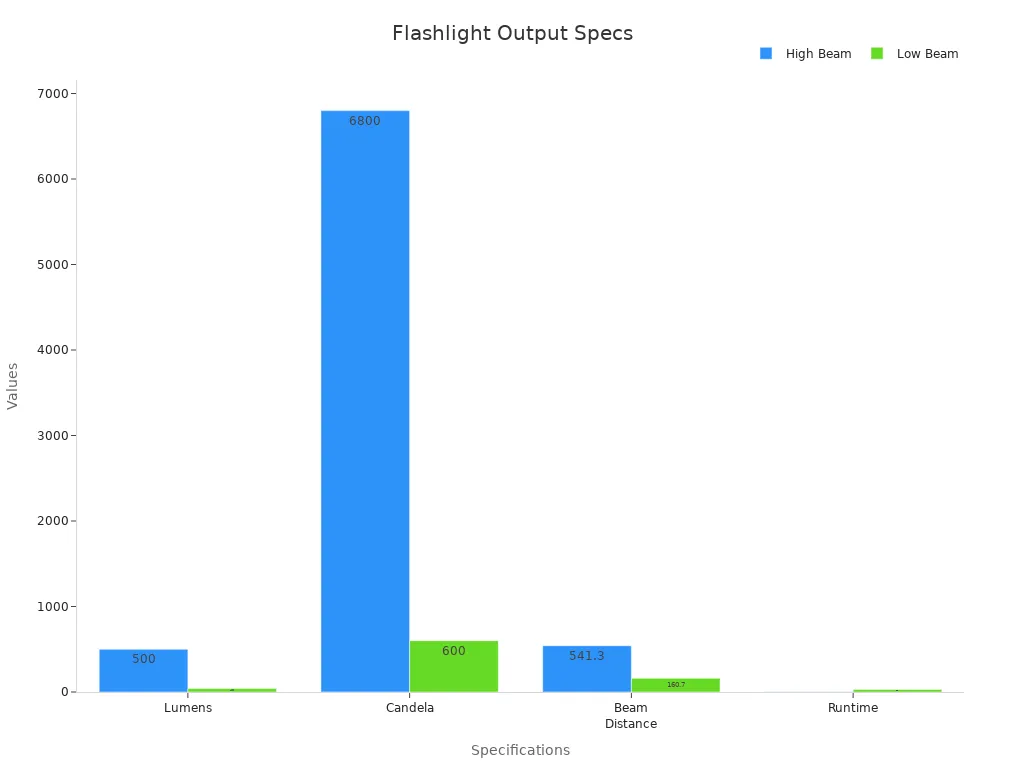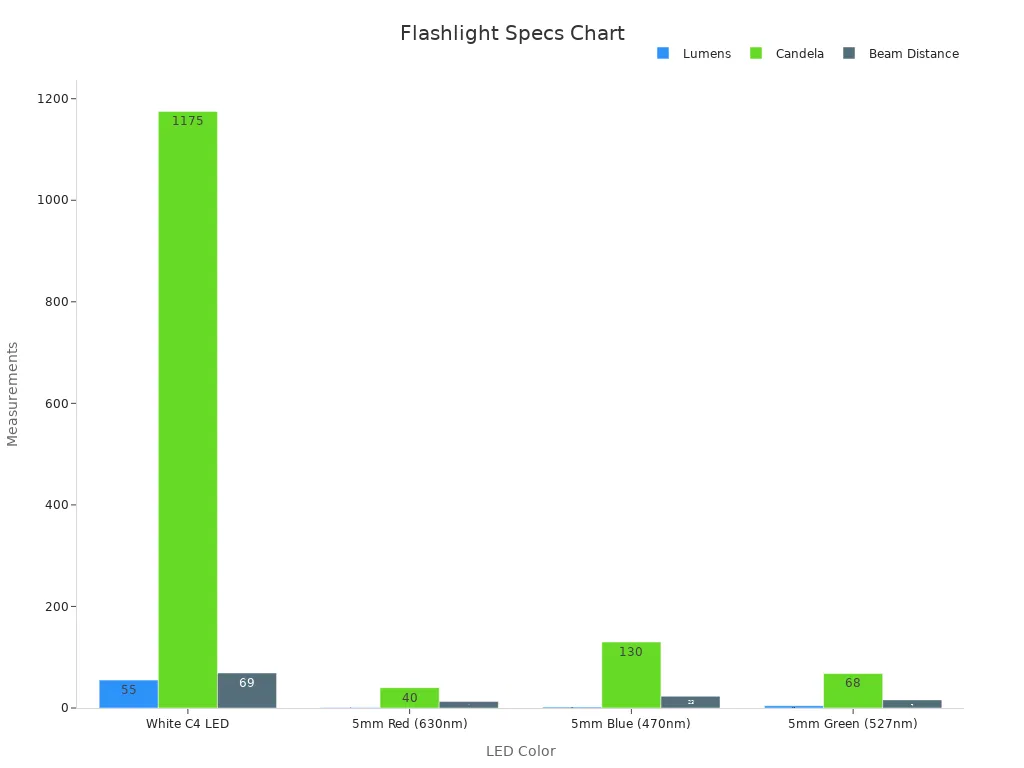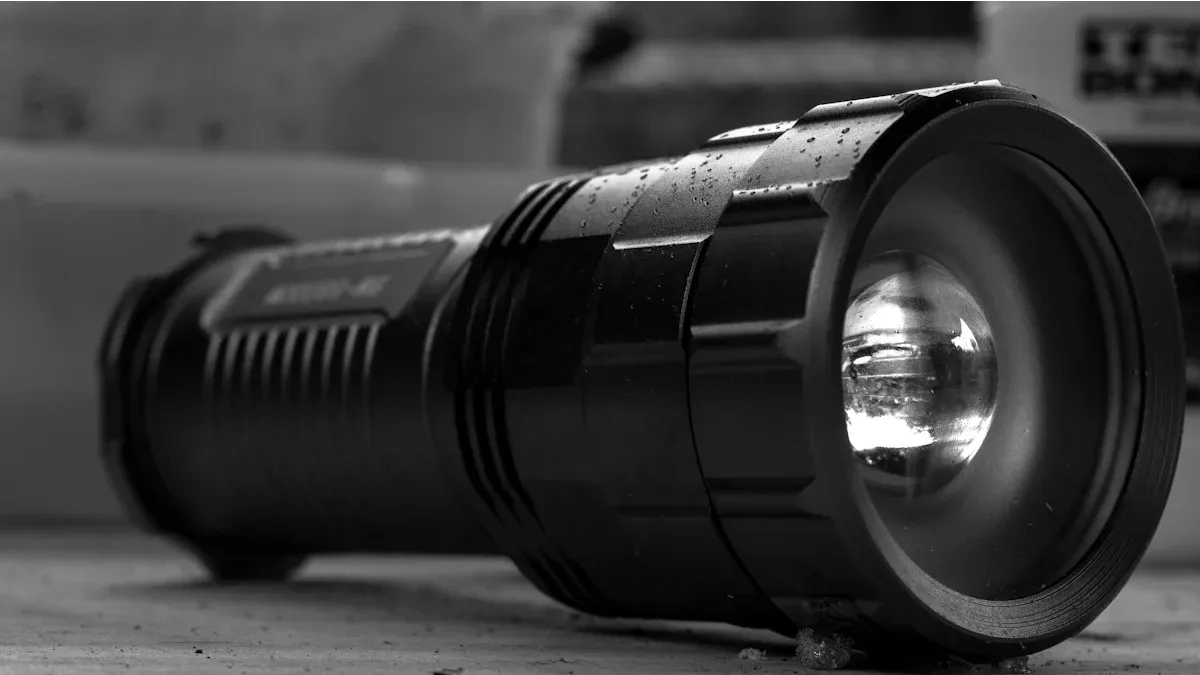
Long-Range Flashlights stand out by offering strong beam distance, high brightness, and durable construction. Many models use advanced LED technology, USB rechargeable batteries, and safety-rated designs. Tactical Flashlights from China Flashlight brands often support OEM Flashlight Customization Services. These features help users see clearly even in low Ambient light conditions.
Key Takeaways
- Long-range flashlights deliver powerful beams that reach far distances by using advanced LED technology and precise optics.
- Durable materials and strict testing ensure these flashlights withstand tough conditions like drops and water exposure.
- Multiple brightness modes and smart features help users adjust light output and extend battery life for different tasks.
Long-Range Flashlights: Performance and Illumination

Beam Distance and Intensity
Beam distance and intensity define how far and how clearly a flashlight can illuminate objects in the dark. Manufacturers use precise methods to measure these features. They follow the ANSI FL 1-2009 standard, which ensures reliable and comparable results across different brands. The process involves measuring the light’s intensity (lux) at specific distances, often at 1 meter from the lens. This measurement, combined with the inverse square law, helps calculate both the peak beam intensity and the maximum beam distance.
Note: Real-world tests at distances up to 600 meters show that these calculations closely match actual performance, making them trustworthy for users who need dependable lighting.
Key steps in validating beam distance and intensity include:
- Measuring lux at standardized distances (1m, 2m, 10m, or 30m)
- Using the inverse square law (lux × distance²) to determine peak beam intensity and maximum beam distance
- Testing multiple flashlight samples and averaging the highest readings
- Following ANSI FL 1-2009 requirements for all performance claims
- Comparing standardized 1-meter lux measurements for easy product comparison
These methods ensure that Long-Range Flashlights deliver consistent and accurate performance, even in challenging environments.
Lumens, Candela, and Output Levels
Lumens and candela are two important numbers that describe a flashlight’s brightness and focus. Lumens measure the total amount of visible light produced, while candela measures the intensity of the beam in a specific direction. High-performance Long-Range Flashlights often offer multiple output levels, allowing users to choose between maximum brightness and longer battery life.
The following table compares high and low beam settings for a typical long-range flashlight:
| Specification | High Beam | Low Beam |
|---|---|---|
| Lumens | 500 | 40 |
| Candela | 6,800 | 600 |
| Beam Distance | 541.3 feet (165 m) | 160.7 feet (49 m) |
| Runtime (CR123A batteries) | 2.75 hours | 30 hours |
| Construction Material | 6000 Series Machined Aircraft Aluminum | |
| Finish | Type II Mil-spec Hard Anodized | |
| Waterproof Rating | IPX7 |
This data shows how output levels affect both brightness and runtime. High beam settings provide greater visibility, while low beam settings extend battery life for longer use.

Some flashlights use different LED colors to suit various tasks. The table below highlights how LED color affects lumens, candela, and beam distance:
| LED Color | Lumens | Candela (Peak Beam Intensity) | Beam Distance |
|---|---|---|---|
| White C4 LED | 55 | 1175 | 69 meters |
| 5mm Red (630nm) | 1 | 40 | 13 meters |
| 5mm Blue (470nm) | 1.8 | 130 | 23 meters |
| 5mm Green (527nm) | 4.5 | 68 | 16 meters |
Flashlights with electronic regulation maintain steady illumination, ensuring consistent performance throughout the battery cycle.

LED Technology and Optics
Modern Long-Range Flashlights rely on advanced LED technology and precision optics to achieve superior performance. LEDs provide high efficiency, long lifespan, and consistent color output. Manufacturers select LEDs based on their ability to produce intense, focused beams that reach far distances. The design of the reflector and lens also plays a critical role. A deep, smooth reflector concentrates the light into a tight beam, increasing throw distance. Some models use specially coated lenses to maximize light transmission and reduce glare.
Tip: Choosing a flashlight with high-quality LEDs and well-designed optics ensures maximum brightness and beam distance, even in harsh conditions.
Optical engineering continues to improve, allowing newer flashlights to deliver more light with less energy. This progress benefits users who need reliable illumination for search and rescue, outdoor adventures, or tactical operations.
Long-Range Flashlights: Power, Durability, and Usability

Battery Life and Power Options
Battery life stands as a critical factor for users who depend on Long-Range Flashlights in demanding situations. Manufacturers use advanced testing methods to ensure batteries deliver reliable performance. Impedance testing measures internal resistance, which affects both efficiency and lifespan. Cycle testing simulates repeated charging and discharging, confirming that batteries can withstand long-term use. Pack-level tests expose batteries to different environments and stress conditions, ensuring they remain safe and functional.
The ANSI/NEMA FL-1 standard defines how to measure light output and runtime. Light output is checked 30 seconds after turning on the flashlight, which allows the LED to warm up and gives an accurate reading. Runtime is measured until the light drops to 10% of its original brightness. This process ensures that users know exactly how long their flashlight will last in real-world conditions. Some brands, such as HDS Systems, calibrate each unit after assembly to guarantee consistent power delivery and runtime.
Ninghai County Yufei Plastic Electric Appliance Factory uses these industry standards to test and verify the battery performance of their Long-Range Flashlights. Their products offer a range of power options, including rechargeable lithium-ion batteries and replaceable cells, giving users flexibility for different tasks.
Tip: Always check the battery type and runtime before choosing a flashlight for extended outdoor or emergency use.
Durability and Build Quality
A high-performance flashlight must survive tough environments. Manufacturers select materials like aluminum alloys, stainless steel, titanium, and ABS plastic for their strength, corrosion resistance, and ability to handle heat and chemicals. These materials undergo strict testing to ensure the flashlight housing remains durable and reliable.
Certifications such as ANSI/NEMA FL1 set benchmarks for impact resistance, water resistance, and other key features. Flashlights must pass drop tests from various heights onto concrete, simulating real-world accidents. The table below shows typical drop test standards:
| Drop Height | Surface | Conditions | Expected Result |
|---|---|---|---|
| 1 meter | Concrete | All parts included | Flashlight must remain functional |
| 6 ft | Concrete | All parts included | Flashlight must remain functional |
| 18 ft | Concrete | All parts included | Flashlight must remain functional |
| 30 ft | Concrete | All parts included | Flashlight must remain functional |
| Metal stairs | Varies | Firefighter lanterns | Flashlight must remain functional |
Manufacturers also test for waterproof ratings and compliance with CE, RoHS, and UL standards. Ninghai County Yufei Plastic Electric Appliance Factory ensures its Long-Range Flashlights meet these requirements, providing users with rugged tools that perform reliably in harsh conditions.
User Interface and Modes
A well-designed user interface makes a flashlight easy and safe to use. Many Long-Range Flashlights feature multiple brightness modes, such as Super Bright, High, Medium, and Low. This allows users to adjust the light for different tasks, from searching large areas to reading maps.
Manufacturers test the user interface for simplicity and safety. For example, the Wurkkos DL70 Dive Light uses a one-button control system. Usability studies show that this design helps users switch modes quickly, even in stressful situations. Ergonomic evaluations focus on weight, balance, and cooling systems to prevent overheating and reduce fatigue during long periods of use.
- Real-world tests include night operations and challenging environments.
- User feedback highlights the importance of clear mode differentiation.
- Community reviews praise balanced designs and effective cooling systems.
Ninghai County Yufei Plastic Electric Appliance Factory incorporates these ergonomic and usability principles into its flashlight designs, ensuring efficient operation for both professionals and outdoor enthusiasts.
Portability and Ergonomics
Portability and comfort are essential for users who carry their flashlight for long periods. Manufacturers design Long-Range Flashlights with lightweight materials and balanced shapes. Ergonomic grips and anti-slip surfaces help users maintain control, even with wet or gloved hands.
Flashlights often include features such as removable clips, lanyard holes, and compact profiles. These details make it easy to attach the flashlight to belts, backpacks, or pockets. Cooling systems and heat-dissipating materials prevent discomfort during extended use.
Note: A well-balanced flashlight reduces arm fatigue and improves handling, especially during search and rescue missions or long hikes.
Additional Features and Smart Functions
Modern Long-Range Flashlights offer advanced features that enhance usability and safety. Some models include battery level indicators, lockout modes to prevent accidental activation, and programmable settings for custom light patterns. Smart temperature regulation protects the flashlight from overheating, while memory functions remember the last used mode.
Manufacturers like Ninghai County Yufei Plastic Electric Appliance Factory integrate these smart functions to meet the needs of both professionals and hobbyists. These features ensure that users have reliable, adaptable lighting tools for any situation.
Long-Range Flashlights deliver strong beam distance, reliable battery life, and rugged durability. The table below highlights key test results that confirm their performance and reliability:
| Attribute | Result/Range | Benefit |
|---|---|---|
| Beam Distance | 291m–356m | Long-range visibility |
| Battery Life | 1h25min–1.5h (high mode) | Extended use |
| Impact Resistance | Passed 2m drop | Physical durability |
| Waterproof Rating | Top safety scores | Reliable underwater operation |
These results show why users trust Long-Range Flashlights in demanding environments.
By: Grace
Tel: +8613906602845
E-mail: grace@yunshengnb.com
Youtube: Yunsheng
TikTok: Yunsheng
Facebook: Yunsheng
Post time: Jul-01-2025
